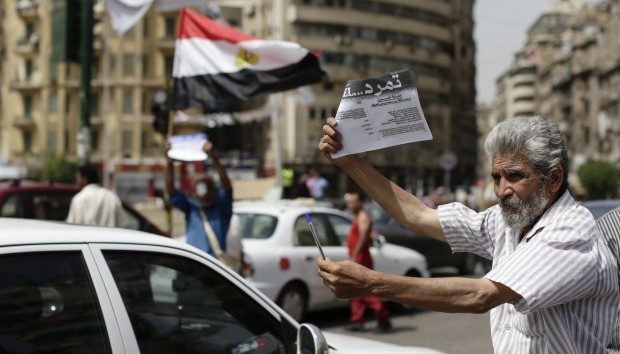Do not believe anyone who tells you they know what will happen in Egypt before, during or after June 30, 2013, the date that the Tamarod (Rebellion) campaign will demonstrate for ousting president Mohamed Mursi and replacing him with a presidential council chaired by the head of the Supreme Court. I am not saying this because I question the millions of signatures collected by Tamarod, nor because major changes do not occur in this manner; rather, I am questioning it because surprises have become a natural part of the Egyptian landscape since 2011. Not only was what happened surprising, but so was what did not happen. Who imagined that the Egyptian Supreme Council of the Armed Forces, which was overthrown on August 12, 2012, would be ousted only a few weeks after it had issued a constitutional declaration that led to it sharing power with the president?
The surprises before and after this date were unimaginable, not only in Egypt, but also in all Arab states that were affected by the tide of change. Furthermore, what happened in Turkey recently was unbelievably surprising, given that the regime there was believed to enjoy immense popularity, had sufficient international alliances to secure a place in NATO, and was believed by everyone to serve as an inspiration for Middle Eastern states and societies.
Of course, we can look for explanations and provide analyses of what happened and what continues to happen, yet we will never know the whole truth. Without doubt, the “structural” systems of the Arab Spring states and squares of liberation, including Taksim square in Istanbul, cannot change just because a group of people—even if they succeeded in collecting 15 million signatures—decided that the status quo must not remain the same.
The four major internal crises gripping the Egyptian state cannot be overcome in this manner, particularly the escalating security crisis in Sinai that saw the murder of army soldiers, the kidnapping of police officers and army soldiers, and the laying of the foundation for an Islamic emirate. The crisis will not end by ousting the president in the same way that a massive gathering of people cannot change the economic situation, or shift the ailing economy—that is most obvious in the long lines of cars in front of gas stations—into a good one overnight.
Today’s insurgents are not totally different from yesterday’s rebels; both have failed to consider how the next regime will be more capable in solving the Egyptian dilemmas at the time of change. No one knows whether or not the time of change will come. It is known that the time of change will result from a political and constitutional crisis that has stifled the Egyptians throughout the past months. This crisis is embodied by a deep political division that has left a wide gap in society to the extent that the dinner between Khairat El-Shater, the deputy general guide of the Muslim Brotherhood, and Amr Moussa, the head of the Congress Party, was considered by the media as an unforgivable sin.
Whatever its aim, the June 30 protests will not improve the Egyptian political process, which has become so chaotic that it is no longer possible to distinguish between the “former” and the “current” regimes or between those who are guilty and those who are innocent.
People called for the ouster of Husni Mubarak, then the Supreme Council of the Armed Forces, and most recently the Muslim Brotherhood. Who is going to fall next?
It is not important now to answer this question—not because we have no direct answer to it, but rather because the problems facing Egypt and all the Arab Spring states cannot come to an end by changing leadership. On top of the four complex domestic crises that I mentioned above, there is a host of external crises that are no less dangerous. Just as these crises have puzzled the former regimes, they place a heavy burden on the current one.
Egypt has nothing to do with the regional isolation it is facing today, thanks to the failure of its neighboring states. To the west, the situation in Libya is dire; to the south, the division of Sudan into two states improved the prospect of division in Egypt; to the east, the situation in Iraq, Syria, Lebanon and Palestine shows signs of impending doom. Let us set Turkey aside, as the state there does not show any symptoms of failure and is still deemed strong. However, it is no longer a shining example for Middle Eastern countries.
The failure that characterizes Egypt’s strategic neighbors should not distract us from other equally serious issues. Relations with the Gulf States, which were a cornerstone of Egypt’s foreign policy over the past four decades, have now become lukewarm. Egypt, which once enjoyed prominent alliances in the Middle East, has now become neither friend nor enemy to the United States and the West.
No one can deny the fact that the danger posed by the crisis over the Nile waters is no longer hypothetical. Rather, it has become a real danger exposing Egyptian political elites on public television. After June 30, Egypt will remain confused. The nascent BRICS countries (Brazil, India, China, Russia and South Africa) may turn their back on Egypt.
All of this will happen after June 30, so stay tuned.

Trackbacks/Pingbacks